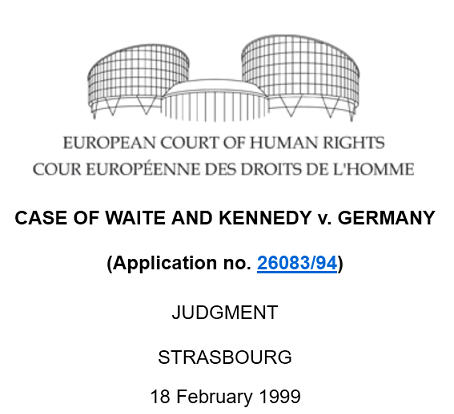

Everybody is entitled to their day in court.
Well, maybe not, if you happen to work for an international organisation.
As we mentioned in the last part, the immunities accorded to international organisations mean that their staff are precluded from pursuing their grievances before national courts of law.
"The risk of a "denial of justice" arises because - unlike employees in the national domain - staff of an international organisation have no access to a domestic court of law in the case of a dispute with their employer."The internal means of redress provided by an international organisation is usually supplemented by a final possibility of judicial review before an international tribunal such as the ILOAT in Geneva.
These parallel legal systems have developed because of a general recognition that the immunity of an international organisation could be problematic from the rule of law perspective.
The risk of a "denial of justice" arises because - unlike employees in the national domain - staff of an international organisation have no access to a domestic court of law in the case of a dispute with their employer.
As a workaround, an approach to dispute resolution has been developed which relies on what are called "internal justice systems".
"As a workaround, an approach to dispute resolution has been developed which relies on what are called "internal justice systems"."The legal scholar Anne-Marie Thévenot-Werner - a professor of law at the Sorbonne University in France - has written extensively on the topic, for example in an article entitled "The Right of Staff Members to a Tribunal as a Limit to the Jurisdictional Immunity of International Organisations in Europe" which was published in 2014.
In this article Thévenot-Werner explains how national courts in Europe have come to recognise that the immunity from national jurisdiction accorded to an international organisation cannot be considered absolute because this could lead to a "denial of justice".
Such immunity is contingent on the guarantee of an effective legal remedy being available to staff in the form of an internal dispute settlement mechanism which provides "equivalent protection" to that provided by a national legal system.
This principle is echoed in the case law of the European Court of Human Rights (ECtHR) which monitors compliance with the European Convention on Human Rights (ECHR).
"In this way - or so the theory goes - even when states transfer certain competences to international organisations, human rights supervisory bodies such as the ECtHR can continue to hold states to account for the use of those powers."The ECtHR has found that the ECHR does not exclude states from transferring competences to international organisations. However, states which are signatories of the ECHR have a responsibility to ensure that their human rights obligations will receive an "equivalent protection" within the context of those international organisations in which they participate.
In this way - or so the theory goes - even when states transfer certain competences to international organisations, human rights supervisory bodies such as the ECtHR can continue to hold states to account for the use of those powers.
The Court's position is based on the consideration that if the contracting states of the ECHR, were permitted to use their membership of an international organisation as an "excuse" for evading their responsibilities under the Convention this would lead to a "loophole" in human rights protection which would be incompatible with the object and purpose of the ECHR.
According to the Court's jurisprudence, the alternative means of legal process on which staff of international organisations are obliged to rely must provide "reasonable alternative means to protect effectively their rights under the [European] Convention [on Human Rights]".

In its landmark judgment delivered in 1999 the ECtHR confirmed that international organisations are obliged to provide their staff with "reasonable alternative means" to protect their fundamental rights under the ECHR.
"...some subsequent judgments of the ECtHR delivered in 2015 indicate that the Court is extremely reluctant to pursue alleged breaches of fundamental rights involving international organisations."However, in practice, the internal dispute resolution mechanisms of international organisations are rarely fit for purpose and this often leads to a de facto denial of justice.
Moreover, as we shall see in the next part, some subsequent judgments of the ECtHR delivered in 2015 indicate that the Court is extremely reluctant to pursue alleged breaches of fundamental rights involving international organisations. ⬆